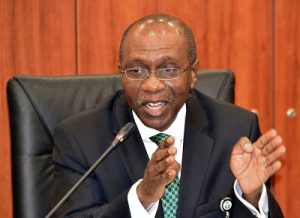
The International Monetary Fund and the Central Bank of Nigeria on Tuesday disagreed on the projections of the Bretton Woods institution for the country’s economic outlook for 2007.
The Regional Economic Outlook for Sub-Saharan Africa authored by the IMF and was presented in Abuja on Tuesday, projected Nigeria’s real Gross Domestic Product to close the year at 0.8 per cent, while inflation would remain elevated at 17.5 per cent.
It also projected the fiscal deficit to deteriorate to five per cent of the GDP; reserve to months of import cover to drop to 5.5 months; while the current account surplus would be at one per cent of the GDP.
The IMF also advised Nigeria to implement greater foreign exchange flexibility and eliminate exchange rate restrictions as imposed on 41 items.

The report stated, “Oil price recovery is insufficient to repair the imbalances in resource-rich countries, while monetary policy normalisation in the United States is poised to worsen external financing conditions.
“For the hardest-hit resource-intensive countries, fiscal consolidation remains urgently needed to halt decline in international reserves and to offset permanent revenue losses.”
It added, “In countries where exchange rate tool is available (Angola, Nigeria), greater exchange rate flexibility and the elimination of exchange restrictions that are inflicting serious harm on the real economy should be part of a coherent policy package.
“Even the modest rebound to two and half per cent expected in 2017 will be to a large extent be driven by one-off factors in the three largest countries – a recovery of oil production in Nigeria, higher public spending ahead of elections in Angola, and the fading of drought in South Africa – combined with modest improvements in their terms of trade.”
However, the Director, Monetary Policy Department, CBN, Mr. Moses Tule, said implementing the Federal Government’s Economic Recovery and Growth Plan would ensure different outcomes from the predictions of the IMF.
Tule said, “Resolution of the Niger Delta crises is expected to make headroom for higher oil exports thus improving the fiscal space. The forex reforms are expected to stabilise the currency and conserve external reserves to levels higher than 5.5 months of import cover.
“The current account is expected to further improve following improved terms of trade with higher oil exports and increased import substitution with local production.”
He added, “With the successful issuance of the recent Eurobonds, investor confidence is fast recovering following series of foreign exchange reforms as evident in the recent sovereign bond issuance offshore.”
 MMS PLUS NG – Maritime, Aviation, Business, Oil and Gas News Online Newspaper with coverage in Maritime, Oil and Gas, Aviation, Power and Energy as well as Financial News
MMS PLUS NG – Maritime, Aviation, Business, Oil and Gas News Online Newspaper with coverage in Maritime, Oil and Gas, Aviation, Power and Energy as well as Financial News









